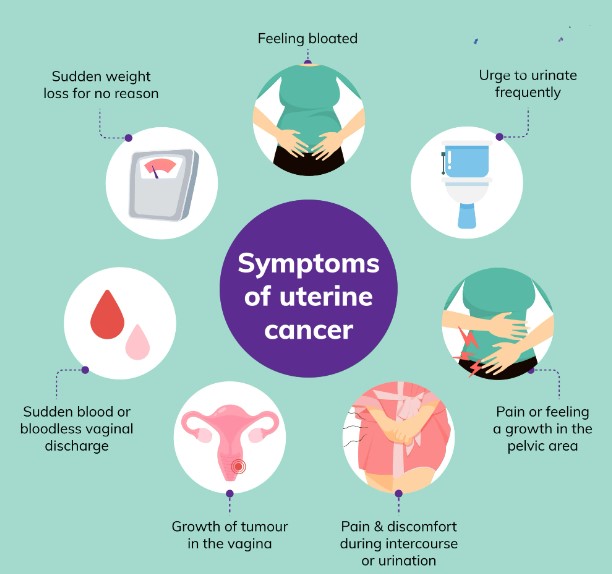Women could be ignoring some potential key symptoms of womb cancer, due to a lack of awareness about what to look out for, experts warn.
One of the five gynaecological cancers is womb cancer (a.k.a uterine or endometrial cancer).
Despite affecting so many, few women are aware of the potential symptoms, but having an awareness about womb cancer and other gynaecological cancers could mean the difference between an early diagnosis and leaving it too late.
With September marking Gynaecological Cancer Awareness Month, Valentina Milanova, women’s health expert and founder of gynae health company, Daye, throws a light on some of the most common symptoms of womb cancer women should be looking out for.
From painful sex, to unexpected vaginal bleeding and irregular menstruation, Milanova believes if more women could spot these signs, they might get diagnosed and receive treatment sooner.

What is womb cancer?
Womb cancer, also known as endometrial or uterine cancer, is cancer that affects the womb. According to the NHS, the womb (uterus) is where a baby grows during pregnancy.
Most womb cancer usually starts in the lining of the womb (endometrium). Womb cancer typically presents with the following symptoms:
Unusual vaginal bleeding, typically happening in between periods, after menopause, after sex or urination.
Irregular menstruation, defined as unforeseen changes to the patient’s menstrual cycle, heavier and longer periods, or breakthrough bleeding in between periods.
Pelvic pain, which is often trivialised and ignored, but can be a symptom of gynaecological cancers.
Painful sex is another symptom that women are taught to normalise, but can be a symptom of womb cancer.
Pelvic pain and pressure are typically a symptom of endometrial cancer progressing.
Larger uterus, which is seen in some cases where the endometrial cancer is causing an enlarged lower abdomen/pelvis.
But Milanova says it is important to note that while these are common symptoms of womb cancer, they can also be caused by various other conditions that are not cancerous, such as hormonal imbalances, uterine fibroids, or polyps.
“This is one reason why some patients may miss or dismiss these symptoms initially,” she adds.
Why do many women miss the symptoms of womb cancer? According to Milanova:
Menopause: Postmenopausal bleeding is often a red flag for womb cancer, but some patients may not realise they have reached menopause and therefore disregard the bleeding as a warning sign.
Assuming it’s normal: Due to the trivialisation of gynaecological pain, many women may assume that irregular periods or changes in menstrual bleeding are normal, which would lead to them not seeking medical attention.
Mistaking endometrial cancer for something else: Symptoms like pelvic pain or weight loss can be attributed to various non-cancerous conditions, leading to a delay in seeking a cancer diagnosis.
Fear: The fear of a cancer diagnosis or denial of potential health issues can lead some individuals to delay seeking medical help.
Who is most at risk of developing womb cancer?
While we don’t know what causes most womb cancers, there are some factors that could increase your risk of developing it.
Age: Womb cancer is most common in postmenopausal women, with the majority of cases diagnosed after age 50.
Hormonal Factors: Excess oestrogen exposure, either due to obesity or certain medical conditions like polycystic ovary syndrome (PCOS), can increase the risk.
Obesity: Obesity is a significant risk factor for womb cancer because it can lead to increased oestrogen levels.
Diabetes: Some studies suggest a link between type 2 diabetes and an increased risk of womb cancer.
It’s important for every patient, especially those in the high-risk categories, to be aware of the symptoms of womb cancer and seek medical support if they experience any concerning signs.
Early detection and treatment can significantly improve the outcome for individuals with womb cancer.


